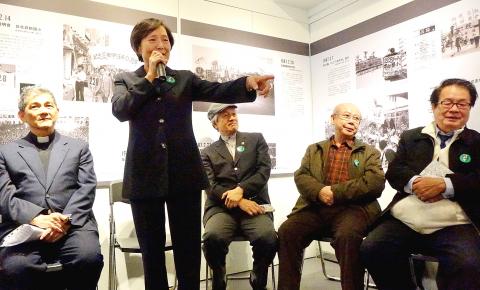An exhibition on the 228 Redress Movement that was led by late democracy pioneer Deng Nan-jung (鄭南榕) was launched in Taipei yesterday to commemorate the 70th anniversary of the 228 Incident and 30th anniversary of the movement’s inception.
The 228 Incident refers to an uprising in 1947 against the then-Chinese Nationalist Party (KMT) regime and the resulting brutal crackdown that left tens of thousands dead and led to nearly four decades of martial law.
Deng was imprisoned in 1986 without trial after then-Taipei city councilor Chang Te-ming (張德銘) accused him of swaying voters ahead of local elections by publishing articles in Deng’s Freedom Era Weekly magazine.

Photo: Chien Jung-fong, Taipei Times
Deng’s wife, former presidential office secretary-general Yeh Chu-lan (葉菊蘭), said at the exhibition’s opening ceremony yesterday that the first task Deng embarked on after his release from prison in 1987 was to seek repatriations for people who were killed in the massacre and oppressed during the White Terror era.
Shortly after his release from prison, Deng cofounded the 228 Peace Day Association and, during martial law, launched the first march advocating redress for those oppressed during the massacre, and for the government to designate Feb. 28 as a national holiday.
More marches followed, and as the following grew, Deng and other association members were frequently targeted by police officers, Yeh said.
“Thirty years later, everyone in the nation can speak freely about and research the 228 Massacre,” she said, calling the movement a “key” that unlocked the shackles placed on society during the White Terror era.
“Only when pain is remembered by the citizenry are history’s lessons learned. Only by learning the truth and understanding the past can Taiwan become a truly normalized and healthy nation,” she said.
“History should not be forgotten,” association cofounder Lee Sheng-hsiung (李勝雄) said.
Chiang Kai-shek (蔣介石) was the perpetrator of the 228 Massacre, Lee said, criticizing Chiang’s descendants, several of whom are politicians, for never apologizing for this atrocity.
Several people who were reported missing in the White Terror era are still unaccounted for, Lee said, urging surviving White Terror perpetrators and their descendants to come forward and explain what actually happened to those people and apologize so that they might be forgiven.
“The democracy people enjoy today is built on the tears, blood and sweat of democracy pioneers and countless broken families,” democracy movement pioneer Lin Tsung-cheng (林宗正) said.
This year’s 228 Incident commemorative events include a re-enactment of the 1987 Tainan march, which is being organized by National Cheng Kung University Student Union member Wu Hsin-ju (吳馨如).
To raise awareness of the 228 Incident, Wu has invited the public to participate in the march, which is to feature replicas of two banners and one sign used by Deng and association members.
The march is to take place on Feb. 28 at 2:28pm from Nanmen Florist Market in Tainan’s Nanmen Road and end at Tang Te-chang Memorial Park.

Taiwanese can file complaints with the Tourism Administration to report travel agencies if their activities caused termination of a person’s citizenship, Mainland Affairs Council Minister Chiu Chui-cheng (邱垂正) said yesterday, after a podcaster highlighted a case in which a person’s citizenship was canceled for receiving a single-use Chinese passport to enter Russia. The council is aware of incidents in which people who signed up through Chinese travel agencies for tours of Russia were told they could obtain Russian visas and fast-track border clearance, Chiu told reporters on the sidelines of an event in Taipei. However, the travel agencies actually applied

New measures aimed at making Taiwan more attractive to foreign professionals came into effect this month, the National Development Council said yesterday. Among the changes, international students at Taiwanese universities would be able to work in Taiwan without a work permit in the two years after they graduate, explainer materials provided by the council said. In addition, foreign nationals who graduated from one of the world’s top 200 universities within the past five years can also apply for a two-year open work permit. Previously, those graduates would have needed to apply for a work permit using point-based criteria or have a Taiwanese company

The Shilin District Prosecutors’ Office yesterday indicted two Taiwanese and issued a wanted notice for Pete Liu (劉作虎), founder of Shenzhen-based smartphone manufacturer OnePlus Technology Co (萬普拉斯科技), for allegedly contravening the Act Governing Relations Between the People of the Taiwan Area and the Mainland Area (臺灣地區與大陸地區人民關係條例) by poaching 70 engineers in Taiwan. Liu allegedly traveled to Taiwan at the end of 2014 and met with a Taiwanese man surnamed Lin (林) to discuss establishing a mobile software research and development (R&D) team in Taiwan, prosecutors said. Without approval from the government, Lin, following Liu’s instructions, recruited more than 70 software

BACK TO WINTER: A strong continental cold air mass would move south on Tuesday next week, bringing colder temperatures to northern and central Taiwan A tropical depression east of the Philippines could soon be upgraded to be the first tropical storm of this year, the Central Weather Administration (CWA) said yesterday, adding that the next cold air mass is forecast to arrive on Monday next week. CWA forecaster Cheng Jie-ren (鄭傑仁) said the first tropical depression of this year is over waters east of the Philippines, about 1,867km southeast of Oluanpi (鵝鑾鼻), and could strengthen into Tropical Storm Nokaen by early today. The system is moving slowly from northwest to north, and is expected to remain east of the Philippines with little chance of affecting Taiwan,